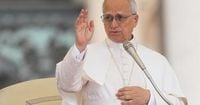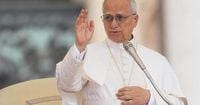In a move that could reshape the future of the Catholic Church in New Orleans, Pope Leo XIV has appointed Bishop James Checchio of Metuchen, New Jersey, as the coadjutor bishop of New Orleans. The announcement, made on September 24, 2025, comes just two weeks after the New Orleans archdiocese agreed to a landmark $230 million proposed settlement for survivors of clergy sexual abuse, marking a pivotal moment in one of the U.S. church’s most protracted and contentious abuse battles, according to the Associated Press.
As coadjutor bishop, Checchio, 59, is now in line to automatically succeed the current archbishop, Gregory M. Aymond, upon his retirement. Aymond, who turned 75 in November 2024—the mandatory retirement age for bishops—has been at the helm during a period of intense crisis and scrutiny for the archdiocese. Despite calls for his resignation amid failures to adequately address abuse allegations, Aymond remained in office, overseeing the bankruptcy process and the finalization of the abuse settlement.
The $230 million settlement, agreed upon on September 8, 2025, is intended to resolve more than 500 abuse claims against the archdiocese. The deal followed a previous proposal in May to pay at least $179.2 million, which survivors’ attorneys deemed insufficient. Survivors now have until late October to vote on whether to approve the revised settlement; if two-thirds agree, payments could begin as early as 2026. This settlement is seen as a crucial step toward justice and closure for victims, though many argue it’s long overdue.
The archdiocese’s decision to file for bankruptcy in May 2020 allowed it to handle all abuse claims collectively rather than address each one in court. While church officials said this approach would streamline the process and ensure fairness, survivors and their advocates have criticized it as a strategy to avoid tough questions and public accountability. According to AP, survivors allege that the move shielded church leadership from facing the full weight of their actions in open court.
At a news conference announcing his appointment, Checchio was immediately confronted with the scandal’s legacy and his soon-to-be predecessor’s record. When asked if he would consider launching an investigation into Aymond for allegedly covering up abuse, Checchio replied, “I don’t have any idea — I don’t have any knowledge of any of that yet.” He added that, in principle, he was willing to investigate, but at present saw “no reason” to do so. This response drew a pointed reaction from Richard Trahant, an attorney representing dozens of abuse survivors, who told AP, “He’s either ill-prepared for his new job, or he was less than truthful.”
Survivors’ groups and their legal representatives have repeatedly accused Aymond of delaying the public acknowledgment of abusive clergy. One case frequently cited is that of former priest Lawrence Hecker, who pleaded guilty last year to raping a teenage boy decades ago and later died in prison. Trahant and others argue that Aymond failed to act swiftly to hold clergy accountable, a criticism that has haunted his tenure.
Aymond, for his part, has denied any mishandling of abuse allegations. Speaking to the Associated Press, he said, “It’s not fair to anybody, it’s certainly not fair to survivors,” expressing regret over how long the settlement process has taken. During the press conference, Aymond defended his record, asserting that abuse was largely a thing of the past in New Orleans and that in his 16 years as archbishop, only one new case had emerged. He also stated his intention to remain as archbishop until the bankruptcy proceedings and other pastoral matters are resolved, and committed to appearing at public forums to listen to survivors’ testimony as part of the settlement process.
The appointment of Checchio is not without its own complications. Bishops in the U.S. have grappled with the legacies of their predecessors for over two decades, but it is rare for an incoming archbishop to be asked about investigating his predecessor while the latter is still alive and in office. Checchio is no stranger to controversy, having managed the fallout in Metuchen from the explosive 2018 sexual misconduct revelations involving then-Cardinal Theodore McCarrick. McCarrick, who served as Metuchen bishop from 1981 to 1986 and later as bishop of Newark, was accused of sexually abusing adult seminarians and minors—a scandal that rocked the Catholic Church and prompted the Vatican to codify reforms in 2019 for investigating and sanctioning bishops who abuse or mishandle abuse cases. Checchio had voted to support these reforms and, as noted by AP, set up an anonymous reporting line for abuse at his previous post.
Terence McKiernan of BishopAccountability.org, an online resource tracking abuse cases, expressed skepticism that Checchio would initiate an investigation into Aymond, given his close ties to Rome. Anne Barrett Doyle, co-director of the same organization, commented to AP that Checchio had been “culpably silent” about McCarrick’s tenure in New Jersey until the scandal became public, despite knowing about a settlement involving one of McCarrick’s adult victims. “Nothing in Checchio’s record suggests that he is gutsy enough to initiate a church investigation against Aymond as much as Aymond deserves it,” she wrote in an email.
For his part, Checchio has expressed both humility and resolve as he prepares to assume leadership in New Orleans. “I am certainly grateful to our Lord and to his vicar, Pope Leo XIV, for sending me to be a part of such a beautiful community,” he said, according to the archdiocese’s website. Checchio, a native of Camden, New Jersey, holds a degree in canon law and an MBA, and served as rector of the U.S. seminary in Rome for a decade before his appointment in Metuchen. He told reporters he looks forward to serving the people of New Orleans and intends to “work hand in hand” with law enforcement to ensure children’s safety. “Everything I can do to make sure our children are safe, I will,” he promised at the press conference.
The road ahead remains uncertain. Survivors have until late October to vote on the proposed settlement, and the outcome will determine the next steps for both the archdiocese and its new leadership. If the settlement is approved, payments could begin as soon as next year, providing long-awaited compensation to those who have suffered. Yet, questions linger about accountability, transparency, and whether meaningful change will follow this latest chapter in the church’s ongoing reckoning with abuse.
As New Orleans stands at this crossroads, the eyes of the Catholic world—and those of countless survivors—remain fixed on its leaders, awaiting not just words, but action.


